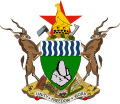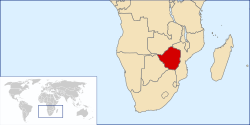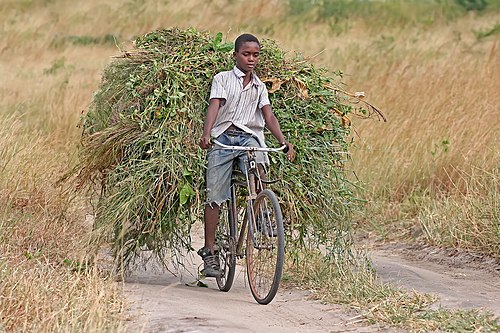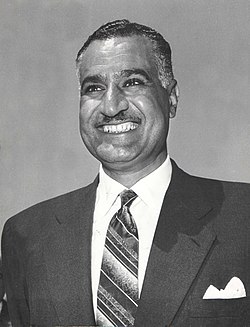Portal:Africa



Africa is the world's second-largest and second-most populous continent after Asia. At about 30.3 million km2 (11.7 million square miles) including adjacent islands, it covers 20% of Earth's land area and 6% of its total surface area. With nearly 1.4 billion people as of 2021, it accounts for about 18% of the world's human population. Africa's population is the youngest among all the continents; the median age in 2012 was 19.7, when the worldwide median age was 30.4. Based on 2024 projections, Africa's population will exceed 3.8 billion people by 2100. Africa is the least wealthy inhabited continent per capita and second-least wealthy by total wealth, ahead of Oceania. Scholars have attributed this to different factors including geography, climate, corruption, colonialism, the Cold War, and neocolonialism. Despite this low concentration of wealth, recent economic expansion and a large and young population make Africa an important economic market in the broader global context, and Africa has a large quantity of natural resources.
Africa is highly biodiverse; it is the continent with the largest number of megafauna species, as it was least affected by the extinction of the Pleistocene megafauna. However, Africa is also heavily affected by a wide range of environmental issues, including desertification, deforestation, water scarcity, and pollution. These entrenched environmental concerns are expected to worsen as climate change impacts Africa. The UN Intergovernmental Panel on Climate Change has identified Africa as the continent most vulnerable to climate change.
The history of Africa is long, complex, and varied, and has often been under-appreciated by the global historical community. In African societies the oral word is revered, and they have generally recorded their history via oral tradition, which has led anthropologists to term them "oral civilisations", contrasted with "literate civilisations" which pride the written word. African culture is rich and diverse both within and between the continent's regions, encompassing art, cuisine, music and dance, religion, and dress.
Africa, particularly Eastern Africa, is widely accepted to be the place of origin of humans and the Hominidae clade, also known as the great apes. The earliest hominids and their ancestors have been dated to around 7 million years ago, and Homo sapiens (modern human) are believed to have originated in Africa 350,000 to 260,000 years ago. In the 4th and 3rd millennia BCE Ancient Egypt, Kerma, Punt, and the Tichitt Tradition emerged in North, East and West Africa, while from 3000 BCE to 500 CE the Bantu expansion swept from modern-day Cameroon through Central, East, and Southern Africa, displacing or absorbing groups such as the Khoisan and Pygmies. Some African empires include Wagadu, Mali, Songhai, Sokoto, Ife, Benin, Asante, the Fatimids, Almoravids, Almohads, Ayyubids, Mamluks, Kongo, Mwene Muji, Luba, Lunda, Kitara, Aksum, Ethiopia, Adal, Ajuran, Kilwa, Sakalava, Imerina, Maravi, Mutapa, Rozvi, Mthwakazi, and Zulu. Despite the predominance of states, many societies were heterarchical and stateless. Slave trades created various diasporas, especially in the Americas. From the late 19th century to early 20th century, driven by the Second Industrial Revolution, most of Africa was rapidly conquered and colonised by European nations, save for Ethiopia and Liberia. European rule had significant impacts on Africa's societies, and colonies were maintained for the purpose of economic exploitation and extraction of natural resources. Most present states emerged from a process of decolonisation following World War II, and established the Organisation of African Unity in 1963, the predecessor to the African Union. The nascent countries decided to keep their colonial borders, with traditional power structures used in governance to varying degrees. (Full article...)
Selected article –

Africae Tabula Nova ("New Map of Africa") is a map of Africa published by Abraham Ortelius in 1570. It was engraved by Frans Hogenberg and included in Ortelius's 1570 atlas Theatrum Orbis Terrarum ("Theater of the World"), commonly regarded as the first modern atlas. The atlas was printed widely in seven languages and 31 total editions between 1570 and 1612.
Africae Tabula Nova is largely based on a wall map published by Giacomo Gastaldi in 1564, while Paolo Forlani's 1562 map of Africa and Gerardus Mercator's 1569 map of the continent were also likely influences on Ortelius. Compared to earlier maps, Ortelius sharpened the shape of Southern Africa in Africae Tabula Nova, shortened the extent of North Africa from west to east, and reduced the eastward extension of Africa, in all cases better depicting reality. The map was also the first to include accurate information from European expeditions into portions of Africa's interior. (Full article...)
Featured pictures –
Did you know (auto-generated) -

- ... that Carver Court in Coatesville, Pennsylvania, was built to house African-American steelworkers during World War II?
- ... that enrollment at a school for African-American students in Virginia grew from 14 pupils to 1,300 in its first ten years?
- ... that the Enterprise, a black newspaper in Omaha, supported a separate African American department at the 1898 Trans-Mississippi Exposition?
- ... that Roland Jefferson, the first African-American botanist to work at the U.S. National Arboretum, helped preserve the famous flowering cherry trees in Washington, D.C.?
- ... that the Shady Rest Golf and Country Club was the home of John Shippen, the first African American to compete in the U.S. Open?
- ... that British communist leader Trevor Carter was the stage manager for the first British-Caribbean carnival, held in St Pancras Town Hall?
Categories
Selected biography –
Gamal Abdel Nasser Hussein (15 January 1918 – 28 September 1970) was an Egyptian military officer and revolutionary who served as the second president of Egypt from 1954 until his death in 1970. Nasser led the Egyptian revolution of 1952 and introduced far-reaching land reforms the following year. Following a 1954 assassination attempt on his life by a Muslim Brotherhood member, he cracked down on the organization, put President Mohamed Naguib under house arrest and assumed executive office. He was formally elected president in June 1956.
Nasser's popularity in Egypt and the Arab world skyrocketed after his nationalization of the Suez Canal Company and his political victory in the subsequent Suez Crisis, known in Egypt as the Tripartite Aggression. Calls for pan-Arab unity under his leadership increased, culminating with the formation of the United Arab Republic with Syria from 1958 to 1961. In 1962, Nasser began a series of major socialist measures and modernization reforms in Egypt. Despite setbacks to his pan-Arabist cause, by 1963 Nasser's supporters gained power in several Arab countries, but he became embroiled in the North Yemen Civil War, and eventually the much larger Arab Cold War. He began his second presidential term in March 1965 after his political opponents were banned from running. Following Egypt's defeat by Israel in the Six-Day War of 1967, Nasser resigned, but he returned to office after popular demonstrations called for his reinstatement. By 1968, Nasser had appointed himself prime minister, launched the War of Attrition to regain the Israeli-occupied Sinai Peninsula, begun a process of depoliticizing the military, and issued a set of political liberalization reforms. After the conclusion of the 1970 Arab League summit, Nasser suffered a heart attack and died. His funeral in Cairo drew five to six million mourners, and prompted an outpouring of grief across the Arab world. (Full article...)
Selected country –
 |
 |
|

| ||
Zimbabwe, officially the Republic of Zimbabwe, is a landlocked country in southern Africa, between the Zambezi and Limpopo rivers. It borders South Africa to the south, Botswana to the southwest, Zambia to the northwest, and Mozambique to the east. The name Zimbabwe derives from "Zimba Remabwe" meaning "big house of stone" in the Shona language. Its use as the country's name is a tribute to Great Zimbabwe, site of the capital of the Empire of Great Zimbabwe. Zimbabwe's highest peak is Mount Nyangani, which lies within Nyanga National Park in the east of the country. The official language of Zimbabwe is English, however the majority of the population speaks Shona.
Under the leadership of former president Robert Mugabe and the current president Emmerson Mnangagwa, the economy of Zimbabwe declined from one of the strongest in Africa to one of the weakest and political tension has never been higher. In 1999, the Movement for Democratic Change was established and have campaigned for an end to "Mugabe's Reign of Terror". 80% of Zimbabweans are unemployed and inflation has soared to well over 15,000%. (Read more...)
Selected city –

Port Said (/saɪd/, Egyptian Arabic: بورسعيد, romanized: Bōrsaʿīd, pronounced [boɾsæˈʕiːd, poɾ-]) is a port city that lies in the northeast Egypt extending about 30 km (19 mi) along the coast of the Mediterranean Sea, straddling the west bank of the northern mouth of the Suez Canal. The city is the capital of the Port Said governorate and it forms the majority of the governorate, where its seven districts comprise seven of the governorate's eight regions. At the beginning of 2023 it had a population of 680,375 people.
The city was established in 1859 during the building of the Suez Canal. There are numerous old houses with grand balconies on all floors, giving the city a distinctive look. Port Said's twin city is Port Fuad, which lies on the eastern bank of the Suez Canal. The two cities coexist, to the extent that there is hardly any town centre in Port Fuad. The cities are connected by free ferries running all through the day, and together they form a metropolitan area with over a million residents that extends both on the African and the Asian sides of the Suez Canal. (Full article...)
In the news
- 5 May 2025 – Sudanese civil war, Sudan–United Arab Emirates relations
- Darfur campaign
- The International Court of Justice dismisses Sudan's case against the United Arab Emirates (UAE) alleging that the UAE violated the Genocide Convention by supplying weapons to the Rapid Support Forces and other paramilitary groups in the Darfur region. (DW) (PBS)
- 4 May 2025 – Sudanese Civil War
- The Rapid Support Forces launch drone attacks on Port Sudan's international civilian and military airport. Drones also hit an ammunition depot at Osman Digna Air Base, causing damage but no casualties. (Al Jazeera)
- 3 May 2025 – South Sudanese Civil War
- At least seven people are killed and 25 others are injured in an airstrike on a hospital run by Médecins Sans Frontières in Old Fangak, Fangak County, South Sudan. (Al Jazeera English) (CTV News) (BBC News)
- 3 May 2025 –
- Togolese President Faure Gnassingbé is sworn-in as President of the Council of Ministers. Following constitutional reform that introduced a parliamentary system, this new post becomes the highest office in the government's executive branch. (BBC)
- 1 May 2025 –
- The bodies of three South African police officers who had been missing for six days are found in the Hennops River. (BBC News)
Updated: 1:05, 6 May 2025
General images -
Africa topics
More did you know –
- ... that Liberia College in the country of Liberia was authorized by the legislature in 1851, but did not start classes until 1863?
- ... that the forced removal of 700,000 people from slums in Zimbabwe in 2005 was called "a crime against humanity" by the UN?
- ... that the supreme god of the southern African Bushmen is Cagn, a trickster who shapeshifts into a praying mantis?
- ... that Bahá'í Faith in Niger began during a period of wide scale growth in the religion across Sub-Saharan Africa near the end of its colonial period?
Related portals
Major Religions in Africa
North Africa
West Africa
Central Africa
East Africa
Southern Africa
Associated Wikimedia
The following Wikimedia Foundation sister projects provide more on this subject:
-
Commons
Free media repository -
Wikibooks
Free textbooks and manuals -
Wikidata
Free knowledge base -
Wikinews
Free-content news -
Wikiquote
Collection of quotations -
Wikisource
Free-content library -
Wikispecies
Directory of species -
Wikiversity
Free learning tools -
Wikivoyage
Free travel guide -
Wiktionary
Dictionary and thesaurus


























































































